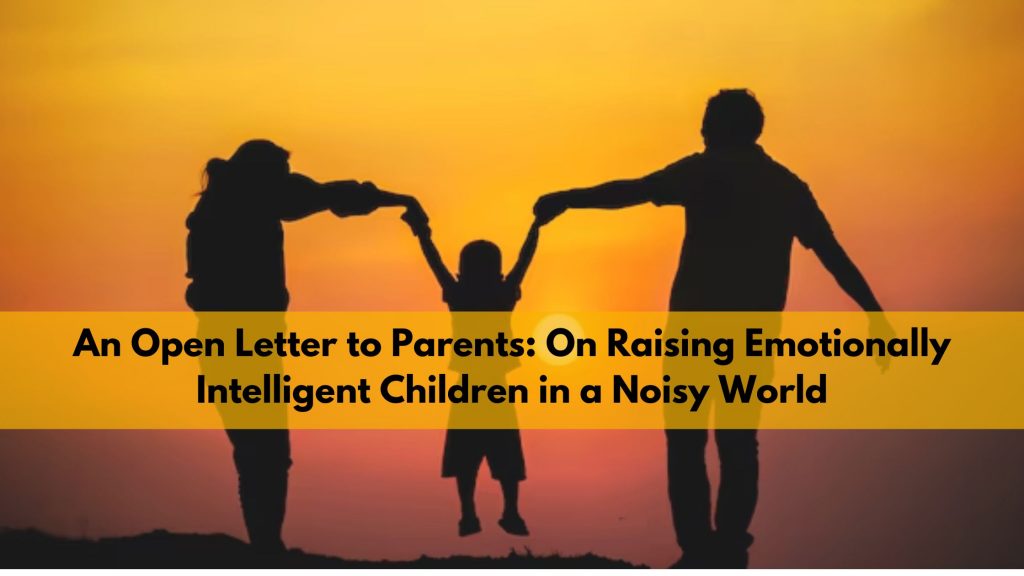
Dear Parents,
Parenting has never been easy—but in today’s world, it can feel especially overwhelming. With endless advice, changing social norms, and our own childhood experiences shaping us, we often find ourselves swinging between extremes.
In an attempt to avoid being too strict, some parents lean toward giving their children complete freedom—mistaking the absence of boundaries for trust. But just as too much control can limit a child’s growth, too much-unsupervised freedom can leave them feeling adrift and unsupported.
Children need both love and limits.
They need to know they are trusted but also that someone is looking out for them, guiding them, and holding space for their emotional and moral development. A child left entirely to figure things out alone may appear independent—but inside, they may feel unseen and overwhelmed.
As counsellors, we meet hundreds of students and parents every year. A straightforward activity we often do is asking students to fill out a workbook. In the section “What do you expect from yourself?” most students write: “I want to make my parents proud.”
When asked, “What do your parents expect from you?” they often write: “They want me to be successful.”
Over time, I’ve come to realize something profound:
Children’s love for their parents is deeply selfless. For most of them, our approval, our praise, and our validation mean everything.
But here’s something even more important—your child needs you the most when they fail, not just when they succeed.
When you say, “You won’t be able to do it,” they believe you.
When you say, “Of course you can,” they find the courage to attempt the impossible.
Such is the power of your words. Please choose them mindfully. A sentence spoken in frustration or without thought may become the truth your child carries in their heart.
I often think of children as trapeze artists in a circus.
They can swing, leap, and take risks—because of the safety net below.
You are that safety net.
When your child knows you are their cushion, their constant, their place to land—they will flourish, blossom, and dare greatly.
Unfortunately, none of us were ever formally taught how to be parents. We didn’t study parenting in school or university. And yet, while not everyone will become a doctor, engineer, or manager—most of us will become parents.
Isn’t it strange that for one of life’s most important roles, we receive the least preparation?
One of the biggest misconceptions we hold is that parents are always right and that children must always obey without question. However, this belief is not only outdated but also potentially harmful.
Let’s move away from the idea that authority equals infallibility.
Our children are not just receivers of our wisdom; they are also mirrors, teachers, and individuals with thoughts worth hearing.
Let’s normalize children giving feedback to their parents—not out of defiance, but out of trust and honesty. Listening to your child doesn’t diminish your role; it strengthens your relationship.
When your child expresses a viewpoint, resist the urge to dismiss it as “too young” or “too naive.”
Don’t infantilize their opinions.
Instead, treat their thoughts with the respect and curiosity you would offer any person you love.
Parenting is not about perfection; it’s about connection.
And connection begins with listening.
Invariably, we find that children who grow up feeling happy, secure, and emotionally supported tend to thrive—not just academically but in life.
They develop confidence, resilience, and a healthy sense of self-worth.
On the other hand, children who are constantly pushed to chase perfection may appear to achieve more on the surface—better grades, awards, or recognition—but often carry invisible wounds.
Perfectionism, when driven by pressure and fear rather than purpose and passion, can leave deep emotional scars. These children may grow up feeling they are never “enough,” and in turn, may unknowingly pass this burden of perfection onto their children.
The cycle of anxiety, self-doubt, and conditional love continues.
Success built on fear is fragile.
But success nurtured in love, trust, and emotional safety has roots that last a lifetime.
Let’s choose to raise whole, emotionally healthy children—not just high-performing ones.
In the end, the greatest gift we can give our children is not the pressure to succeed but the freedom to grow—secure in the knowledge that they are loved, accepted, and heard.
Let us strive to be the kind of parents who not only prepare the path for our child but also prepare the child for the path—with empathy, patience, and trust.
Because one day, our children will not just remember what we taught them—
they will remember how we made them feel.
Let’s make them feel safe.
Let’s make them feel seen.
Let’s make them feel unconditionally loved.
That is the foundation on which everything else can be built.
Confused about raising Gen Z and Alpha kids? Fill the form below to explore expert counselling and empower your child to thrive.
Let Our Experts Help You

About the Author
Mrs. Naheed Varma is a senior career counsellor and Head of CSR at the Institute for Career Studies. She brings 25 years of journalism experience, having worked with The Times of India, The Hindustan Times, and The Indian Express. At ICS, she leads student counselling, outreach programs, and the Postgraduate Diploma in Career Counselling and Guidance.
Connect on LinkedInEdited by: Mr Siddhant Kumar
Like this post? For more such helpful articles, click on the button below and subscribe FREE to our blog.

